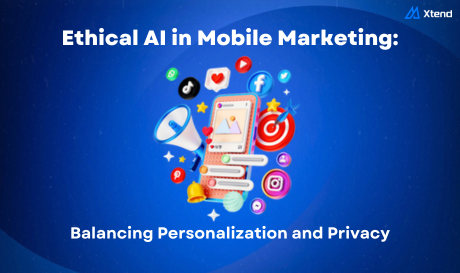Artificial Intelligence (AI) has emerged as a powerful tool for delivering personalized consumer experiences. However, with great power comes great responsibility. At Xtend, we believe that the future of mobile marketing lies not just in leveraging AI's capabilities but also in doing so ethically and responsibly. Let's explore the delicate balance between personalization and privacy in AI-driven mobile marketing.
The Personalization Promise
AI-powered personalization in mobile marketing offers numerous benefits:
- Enhanced User Experience: Tailored content and offers that resonate with individual preferences.
- Improved Relevance: Ads that align with users' interests and needs, reducing ad fatigue.
- Increased Engagement: More meaningful interactions between brands and consumers.
- Better ROI: More efficient ad spending through targeted campaigns.
The Privacy Challenge
While personalization can significantly improve the user experience, it also raises significant privacy concerns:
- Data Collection: The extent and methods of gathering personal information.
- Data Usage: How collected data is utilized and potentially shared.
- Transparency: AI's role in personalizing content.
- User Control: Empowering users to manage their data and personalization preferences.
Striking the Right Balance
At Xtend, we believe that ethical AI in mobile marketing is not just possible but essential. Here's how we approach this balance:
1. Transparent Data Practices
- Clear Communication: We ensure users understand what data is collected and how it's used.
- Opt-In Mechanisms: Giving users control over their participation in personalized marketing.
- Data Minimization: Collecting only the data necessary for effective personalization.
2. Robust Data Protection
- Advanced Encryption: Protecting user data with state-of-the-art security measures.
- Regular Audits: Conducting frequent security checks to identify and address vulnerabilities.
- Limited Data Retention: Storing data only for as long as necessary.
3. Ethical AI Design
- Fairness in Algorithms: We regularly test our AI models to prevent bias and discrimination.
- Explainable AI: Developing AI systems that understand and explain decision-making processes.
- Human Oversight: Maintaining human supervision over AI systems to ensure ethical operation.
4. User Empowerment
- Granular Controls: Allowing users to fine-tune their personalization preferences.
- Data Access: Giving users easy access to view and manage their data.
- Right to be Forgotten: Offering straightforward processes for users to delete their data.
5. Contextual Relevance
- Respecting User Context: Ensuring personalization considers not just user data but also the current context of their mobile usage.
- Appropriate Timing: Using AI to determine the most suitable moments for engagement, avoiding intrusive experiences.
Case Study: Ethical AI in Action
At Xtend, we recently worked with a significant retail client to implement an AI-driven personalized mobile marketing campaign. Here's how we balanced personalization and privacy:
- Transparent Opt-In: Users were informed about the personalization features and allowed to participate.
- Anonymous Profiling: Instead of using personal identifiers, we created anonymous user profiles based on behavior patterns.
- On-Device Processing: Much of the AI processing was done on users' devices, minimizing data transfer.
- Dynamic Consent: Users can easily adjust their preferences or opt-out directly from the app anytime.
The result? A 40% increase in engagement rates and a 25% boost in customer satisfaction scores while maintaining a 98% opt-in rate for personalized marketing.
The Future of Ethical AI in Mobile Marketing
As AI technology advances, the importance of ethical considerations will only grow. We foresee several key developments:
- AI Ethics Boards: More companies will establish dedicated teams to oversee the ethical implications of their AI systems.
- Regulatory Compliance: AI systems will be designed with built-in features to comply with evolving data protection regulations.
- Federated Learning: Advancements in privacy-preserving machine learning techniques will allow personalization without centralized data storage.
- User-Controlled AI: Emergence of personal AI assistants that manage individual data and personalization preferences across platforms.
Conclusion: A Commitment to Ethical AI
At Xtend, we believe that the future of mobile marketing lies in ethical AI practices that respect user privacy while delivering personalized experiences. By prioritizing transparency, data protection, and user empowerment, we can harness the power of AI to create marketing experiences that are effective, trustworthy, and respectful.
The path to ethical AI in mobile marketing is an ongoing journey, not a destination. It requires constant vigilance, adaptation, and a commitment to putting users first. As we continue to innovate in AI-driven mobile marketing, we remain dedicated to upholding the highest ethical standards.
Are you interested in implementing ethical AI practices in your mobile marketing strategies? Contact Xtend today to learn how we can help you balance personalization and privacy, ensuring your marketing efforts are effective and responsible.











